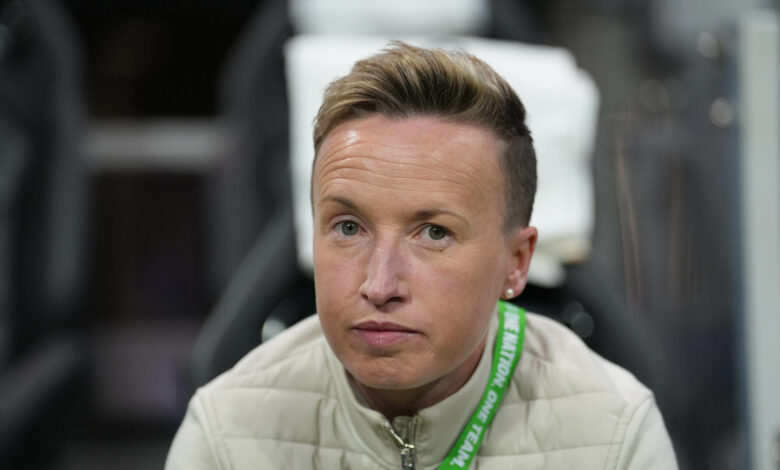Bev Priestman, the Canadian coach at the center of the Olympic espionage scandal

Bev Priestman’s sacking at the Paris Olympics following the Canada spying scandal raises questions about the future, let alone the legacy, of a coach previously regarded as one of the most respected in international women’s football.
At a press conference on Friday, Canadian Olympic Committee (COC) CEO David Shoemaker announced that he is now aware of “prior use of drones against opponents prior to the Paris 2024 Olympic Games,” which also risks jeopardizing one of Canada’s proudest modern sporting achievements.
Their gold medal at the 2021 Tokyo Games was Canada’s first in women’s soccer and earned Priestman two consecutive nominations for FIFA Coach of the Year. There will be no third act for a while: FIFA disciplinary procedures have resulted in Priestman being banned from all soccer-related activities for a year. Canada’s assistant coach Jasmine Mander and the staff member who operated the drone, Joseph Lombardi, have also been banned from soccer for a year. FIFA has deducted six points from the team’s total in the Olympic group stage. Canada has appealed the points deduction, but either way, the chances of a second consecutive gold medal appear slim.

GO DEEPER
Canada, New Zealand and how an Olympic spy scandal unfolded
Ironically, the previous Olympics marked a revival in Priestman’s reputation after she had, in her own words, reached “the lowest point of her career” when she was overlooked for the role of England manager.
Priestman had spent two-and-a-half years with England’s Lionesses as assistant to former manager Phil Neville, expecting it to culminate in an Olympic Games in 2020 (later postponed until 2021 due to the Covid-19 pandemic) and a home championship a year later. Indeed, she had made the move from Canada to England – where she had worked in the youth academy for five years – with those tournaments in mind.
But when Neville left for Inter Miami in the MLS, the English Football Association (FA) looked elsewhere. They believed that Neville had groomed her to take over, but the FA instead opted for then Dutch national coach Sarina Wiegman, with Norwegian World Cup winner Hege Riise as interim and head coach of Team GB until Wiegman completed the Netherlands’ Olympic cycle.
Feeling ‘overlooked’, Priestman took a brief stint as England Under-18 manager in preparation for the Under-17 World Cup, wanting more, but with no clear next step.
The global lockdown caused by Covid exacerbated those feelings of disorientation, but it also provided the testing ground on which Priestman built the most compelling chapter of her career. She devoted the first few months of the pandemic to reinventing herself as a coach, burying herself in performance podcasts, training manuals and soccer autobiographies in preparation for whatever came next. That, of course, was the Canadian women’s national team and a gold medal at the Tokyo Games.
While England proved uninspiring under Riise and Team GB were knocked out of the Olympics in the quarter-finals, those back in Priestman’s homeland dreamed of what might have been if they had continued with the person Neville described as “one of the best female coaches in England”.
Priestman had the opportunity to work with clubs, but a position with Canada was a better fit given their shared history.
She has long been considered a protégé of John Herdman, learning from the former Canada women’s national team coach as a technical assistant at the 2015 World Cup and the 2016 Rio Olympics. Herdman, who is now the head coach of Toronto FC, was the head coach of the Canada women’s national team from 2011 to 2018 and the head coach of the men’s team from 2018 to 2023. During those years, he was also involved in youth soccer development through Canada Soccer’s Excel program, which aimed to streamline the youth pathway to the senior level.

GO DEEPER
The inner turmoil that led John Herdman to leave Canada Soccer for Toronto FC
Herdman has also been involved in the use of drones during his time at Canada Soccer, including an incident in 2021 when Honduran press reported that their national men’s team had spotted a drone during a training session for a World Cup qualifier. Canada Soccer CEO Kevin Blue said at a news conference on Friday that he was concerned about “a potential long-term, deep-rooted systemic culture” of surveillance of other teams in both the women’s and men’s teams.
The Athletics Canada has reported that it deployed an employee to observe a U.S. men’s national team training session ahead of a January 2021 exhibition match, according to multiple sources with knowledge of the situation, who requested anonymity to protect their position.

GO DEEPER
Using a drone to spy on another team… what’s the point? Is it really worth the risk?
Priestman has a long history of coaching in Canada’s youth and senior national team programs, including working as a technical assistant and assistant coach under Herdman from 2013 to 2018. After Herdman moved to coach the Canadian men’s national team in early 2018, Priestman joined Neville’s England staff.
Her deep connection to the sport in Canada meant that when it came to the 2021 Olympics, the players Priestman had first met as teenagers were now in their prime. With them, she often invoked a refrain from Herdman’s days: “Change the colour of the medal.” Herdman was referring to Canada’s bronze medal at the 2012 Olympics; they won the same medal in 2016. That Priestman’s predecessor, Kenneth Heiner-Moller, oversaw an exit in the round of 16 at the 2019 World Championships reinforced the sense that they needed a way to take the next step.
Even Priestman’s wife, former New Zealand soccer star Emma Humphries, was skeptical that bronze would turn into gold. She told FIFA’s website: “When Bev applied for the job with Canada, I remember her saying to me, ‘I’m going into that interview with the theme of changing the color of the medal.’ And honestly, I turned to her and said, ‘Don’t be stupid!’. I could just see how difficult it would be for that team. They hadn’t beaten anyone in the top 10 in 15 games, so I was worried that Bev was setting herself up for failure.”

Bev Priestman and her team celebrate winning gold at the Tokyo Olympics (Alex Livesey – FIFA/FIFA via Getty Images)
Canada’s Olympic triumph included a 1-0 victory over the United States national team (USWNT), their first in 20 years, and two games that went to penalty kicks.
“After the last World Cup, it was like, ‘ugh,’ you know? We just didn’t click,” then-team captain Christine Sinclair said at a 2021 news conference shortly after Canada won the gold medal. “Bev came in and changed the attitude of this team.” Sinclair added that Priestman “brought the things we all learned under John, but added her own flair to it.”
Priestman, however, has never won a gold medal. “The coaches don’t really get one,” she said in 2022. “It’s just the players. I didn’t think I cared until I won one, and then you want one. People say, ‘You won a gold medal. You got on the podium.’ What people talk about are all those moments — but I got on the podium because I was at my lowest point and I pushed myself to be the best I could be.”
Priestman first met Herdman when she was a 12-year-old youth player in their shared hometown of Consett, County Durham, England. Herdman was coaching a youth training session and encouraged Priestman to become a coach. After graduating from the University of Liverpool in 2007 and working at Everton, Priestman followed Herdman to New Zealand, where he was head coach of the Ferns from 2006 to 2011. Priestman held various development roles there from 2009 to 2013, rising from women’s development manager to head of football development. She met her wife there, and the couple’s son, Jack, was born in Canada in 2018.
Reports linked Priestman to a return to her home country ahead of the 2023 Women’s World Cup, when a dispute over pay, funding and fairness between the Canadian federation and its players dominated the team’s preparations. She told FIFA’s website in April of this year that she had “worried about things that no other head coach in the world has had to worry about” during that period.
That unfortunate campaign included a 4-0 defeat to host nation Australia, which saw Canada eliminated in the group stage for the first time in 12 years.
Despite that 2023 performance, Canada Soccer extended Priestman’s contract in early 2024, securing her services beyond the 2027 World Cup. Up until these Olympics, Priestman’s reputation was known as a young and energetic presence in the Canadian lineup and someone who interacts with the press in a friendly manner.
Canada Soccer has not fired Priestman as of the publication of this article and an internal investigation into the matter is ongoing.

GO DEEPER
A history of football espionage: drones, trainees in training and kit men in ceilings
(Additional contributor: Steph Yang)
(Top photo: Brad Smith/ISI Photos/USSF/Getty Images for USSF)




